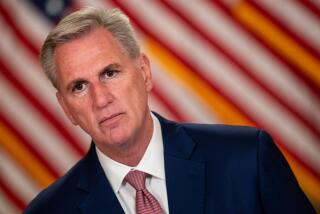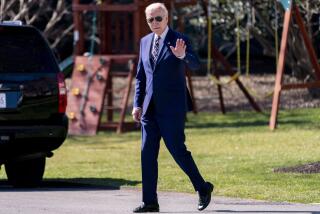Bush’s Budget Not Sold Yet
- Share via
President Bush had two major goals Tuesday in his first address to Congress: sell himself as president and sell his far-reaching budget proposal.
He succeeded mightily in the first. Bush’s manner was presidential and his delivery confident. He embraced greater federal spending on programs that surely will be popular--education, most prominently. And Bush was no doubt boosted by the inevitable comparison with former President Bill Clinton, whose image has been badly tainted by the pardon scandals.
Bush delivered mostly familiar news on the budget front, sticking to his long-proposed $1.6-trillion tax cut over the next decade, elevating spending on defense, education and health care. He also agreed to slash the size of public debt by $2 trillion over the next 10 years and would put the tax cut into effect more quickly than originally planned. Bush’s intended sale of his budget proposal hasn’t been closed yet because what the president is promoting simply is not all that it’s purported to be. Though steadily couched in words of fairness, bipartisan respect and common ground, Bush’s plan carried some old and new red flags. His promise to put aside nearly a trillion dollars over 10 years in a “contingency fund” awaits much more detail. As it stands, Bush or Congress could just as easily use the money for pet programs.
Bush’s promise to keep discretionary spending at 4% also contains big downsides because the much larger increases in education and some other popular programs come at the expense of worthy programs with fewer defenders, from support for the arts to housing for the poor. And Bush wants to appoint a commission--yet another commission!--to study Social Security reform, the most-studied topic of the last decade.
Much will depend on the more detailed fiscal 2002 budget, to be unveiled today.
Both parties in Congress broadly agree that some of the multitrillion-dollar estimated surplus should be returned to taxpayers, public debt should be paid down and spending on selected programs should be increased. Beyond that, according to recent polls, most people do not see large tax cuts as their top priority, especially given the uncertainty of 10-year revenue projections.
Much will depend on Bush’s willingness to compromise and on a bipartisan move in Congress to demand more balance between tax cuts and program spending. And why not give wage earners some relief on the Social Security/Medicare payroll tax, which now is the largest tax for most workers?
Tax cuts should come after the government’s programs have been funded realistically and as much debt as is honestly possible has been paid.
Few of those listening to Bush in the joint session of Congress were alive in 1930, the last time the country managed to have balanced its books for three consecutive years. It will be up to Congress to make sure that extravagant permanent tax cuts and wasteful pork-barreling do not squander the surplus. In the meantime, the new president has fully arrived--front and center, his political skills now put to full test.
More to Read
Get the L.A. Times Politics newsletter
Deeply reported insights into legislation, politics and policy from Sacramento, Washington and beyond. In your inbox three times per week.
You may occasionally receive promotional content from the Los Angeles Times.










